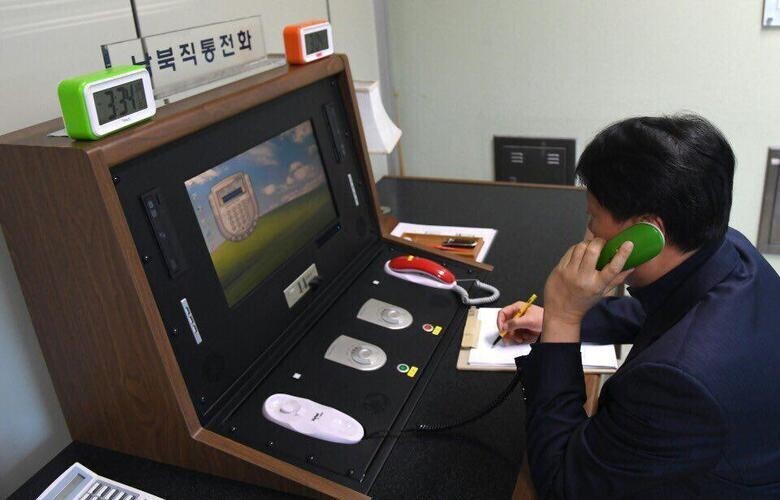hankyoreh
Links to other country sites 다른 나라 사이트 링크
N. Korea has routinely severed communication in response to inter-Korean friction

This isn’t the first that North Korea has announced it would completely severe all lines of communication with the South. In fact, it has resorted to this harsh measure every time inter-Korean relations have broken down.
The direct phone line between the two sides was laid shortly after the first preliminary meeting between the South and North Korean branches of the Red Cross on Sept. 20, 1971. South Korea had suggested establishing the line, and North Korea had agreed to the idea. Thus far, this and other lines have been disconnected and reconnected six times.
A historical survey shows that North Korea has been the one to cut the lines of communication. The North has typically taken this step to express its irritation toward incidents that lead to inter-Korean friction, such as the axe murder of two US soldiers in Panmunjom in 1976 or South Korea-US joint military exercises. North Korea has also suspended dialogue in response to the UN Security Council passing sanctions against Pyongyang, political or military actions taken by South Korea, such as its joint sponsorship of a North Korean human rights resolution at the UN, its imposition of unilateral sanctions against North Korea (such as the May 24 Measures), and the closure of the Kaesong Industrial Complex.
The most recent incident was on Feb. 11, 2016, when North Korea cut the hotline and the telephone lines at Panmunjom after issuing a statement by the Committee for the Peaceful Reunification of the Fatherland.
Then South Korean President Park Geun-hye had closed the Kaesong Complex after North Korea launched a long-range missile, and North Korea announced that it was cutting the lines of communication in retaliation.
Nearly two years later, North Korean leader Kim Jong-un expressed his willingness for North Korea to take part in the Pyeongchang Winter Olympics and his determination to improve inter-Korean relations in his New Year’s address on Jan. 1, 2018. The very next day, South Korean Unification Minister Cho Myung-kyun proposed that the two sides hold high-level talks and repair the lines of communication, a proposal that Ri Son-kwon, then chairman for the Committee for the Peaceful Reunification of the Fatherland, accepted on Jan. 3.
The communication lines repaired at that time had been in operation for two years and five months when North Korea announced that they would be cut on June 9.
By Noh Ji-won, staff reporter
Please direct comments or questions to [english@hani.co.kr]
Editorial・opinion
![[Column] Season 2 of special prosecutor probe may be coming to Korea soon [Column] Season 2 of special prosecutor probe may be coming to Korea soon](https://flexible.img.hani.co.kr/flexible/normal/500/300/imgdb/original/2024/0426/3317141030699447.jpg) [Column] Season 2 of special prosecutor probe may be coming to Korea soon
[Column] Season 2 of special prosecutor probe may be coming to Korea soon![[Column] Park Geun-hye déjà vu in Yoon Suk-yeol [Column] Park Geun-hye déjà vu in Yoon Suk-yeol](https://flexible.img.hani.co.kr/flexible/normal/500/300/imgdb/original/2024/0424/651713945113788.jpg) [Column] Park Geun-hye déjà vu in Yoon Suk-yeol
[Column] Park Geun-hye déjà vu in Yoon Suk-yeol- [Editorial] New weight of N. Korea’s nuclear threats makes dialogue all the more urgent
- [Guest essay] The real reason Korea’s new right wants to dub Rhee a founding father
- [Column] ‘Choson’: Is it time we start referring to N. Korea in its own terms?
- [Editorial] Japan’s rewriting of history with Korea has gone too far
- [Column] The president’s questionable capacity for dialogue
- [Column] Are chaebol firms just pizza pies for families to divvy up as they please?
- [Column] Has Korea, too, crossed the Rubicon on China?
- [Correspondent’s column] In Japan’s alliance with US, echoes of its past alliances with UK
Most viewed articles
- 1‘We must say no’: Seoul defense chief on Korean, USFK involvement in hypothetical Taiwan crisis
- 2N. Korean delegation’s trip to Iran shows how Pyongyang is leveraging ties with Moscow
- 3‘Weddingflation’ breaks the bank for Korean couples-to-be
- 4Korea sees more deaths than births for 52nd consecutive month in February
- 5[Editorial] New weight of N. Korea’s nuclear threats makes dialogue all the more urgent
- 6[Column] Park Geun-hye déjà vu in Yoon Suk-yeol
- 7[Column] Has Korea, too, crossed the Rubicon on China?
- 8[Guest essay] The real reason Korea’s new right wants to dub Rhee a founding father
- 9Will NewJeans end up collateral damage in internal feud at K-pop juggernaut Hybe?
- 10Why Korea shouldn’t welcome Japan’s newly beefed up defense cooperation with US